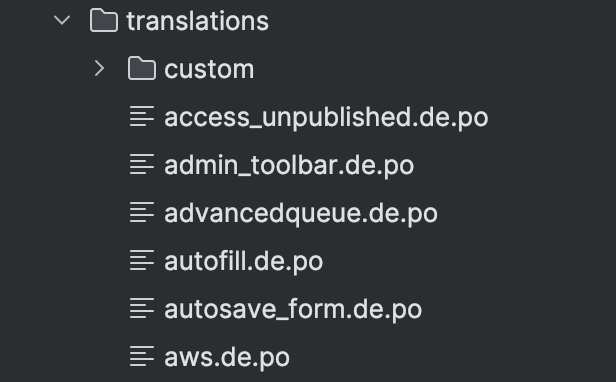· 2 min read
Streamlining Drupal Translation Deployment with Locale Deploy
Locale Deploy offers a streamlined approach to managing translations in Drupal, ensuring they are updated in a controlled and predictable manner. Learn how to set up and use this module to simplify translation management.

Introduction
Handling translations for Drupal core and contributed modules has always been a challenge, often requiring manual updates via Drush or the UI. This process can make tracking new translations difficult and even introduce untracked changes on a live site. Additionally, since locale strings and configurations are closely linked, changes in one can sometimes unintentionally affect the other.
Locale Deploy offers a streamlined approach by treating translations as part of the deployment workflow, ensuring they are updated in a controlled and predictable manner.
Note: This module is specifically for deploying locale strings and does not manage content translations.
Prerequisites
For best results, ensure your custom code is organized within the modules/custom directory of your Drupal project.
Setting Up Locale Deploy
Installing the module follows the same process as any other contributed Drupal module. Once installed, it automatically updates locale.settings to:
- Allow non-customized translations to be overridden.
- Protect customized translations from being accidentally changed.
- Disable automatic translation updates via cron.
- Restrict translation updates from
localize.drupal.orgto a dedicated Drush command.
Managing Translations
With Locale Deploy in place, all modifications to locale.settings are locked to prevent accidental changes through the UI. Instead, translations are managed via Drush commands.
Drush Commands for Translation Management
drush locale-deploy:localize-translations
Fetches translations fromlocalize.drupal.org, stores them locally, updates the database, and exports configuration to keep everything in sync.drush locale-deploy:custom-translations
Extracts translations from themodules/customfolder and places them in the local translations directory, generating one file per language.
Additionally, the module integrates with updatedb, ensuring translations are automatically updated when running drush deploy.
Customizing Translations
To ensure your custom translations take precedence over core and contributed module translations, follow these steps:
- Confirm the string exists in your custom modules. If it doesn’t, add the following function:
function _modulename_will_never_be_called(): void { // Include context if necessary. t('Paragraphs'); } - Run
drush locale-deploy:custom-translations. - Modify the translation in
translations/custom/custom.LANGCODE.poas needed.
This approach ensures your translations remain intact and are deployed consistently alongside site updates.
Conclusion
Locale Deploy simplifies translation management by aligning it with Drupal’s standard deployment processes. By automating updates and ensuring consistent handling of translations, the module reduces the risk of unintended changes and enhances site stability.
Furthermore, SiteCare, our Drupal updater, seamlessly integrates the Locale Deploy module. This means translations are updated alongside configuration changes, ensuring a smooth and reliable deployment process for multilingual sites. If you’re looking for a structured and automated approach to translation updates, Locale Deploy is an invaluable addition to your workflow.
